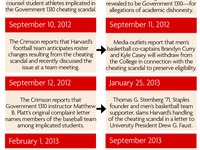As the scandal unfolded, athletics assumed a central place in the public’s perception of the incident.
Reporters gathered in front of Currier House after news broke that the basketball co-captains and Currier roommates Kyle Casey and Brandyn Curry would withdraw from the College for a year in connection with the Government 1310 scandal in order to maintain their academic eligibility. They quickly became the face of the scandal under the glare of the national spotlight.
With two of Harvard’s most prominent athletes publicly branded as cheaters, the scandal piqued interest in discussions about the role of athletics at Harvard. Accusations of lowered academic standards were levied at men’s basketball coach Tommy Amaker, Athletics Director Robert L. “Bob” Scalise, and the administration.
Suspicions that this was an athletes’ scandal were raised as it became increasingly clear that Government 1310’s reach was not just limited to Curry and Casey, or even just one or two sports.
On September 10, 2012, just five days before the football team’s season opener against San Diego, a report surfaced that Harvard’s team was bracing for potential roster changes as a result of the investigation. The news about Curry and Casey broke on Sept. 11, and the Sept. 12 leak of Platt’s initial complaint letter identified members of the baseball team as among the accused students. Media outlets also soon reported that men’s hockey had been affected by the scandal.
Multimedia
“The scariest thing with the whole situation was how public it got,” Jordan said. “Now I’m going back home for Thanksgiving, and people are asking me if I was involved in the cheating scandal.”
Despite this attention paid toward athletes, the number of student-athletes affected by the scandal could not be definitively confirmed. Even as rosters appeared seemingly depleted, all reports that missing players were gone due to their involvement in the scandal ultimately amounted to speculation.
It should be noted that student-athletes set to return to a team choose instead to leave their sport for any number of reasons on a regular basis. In 2009, Harvard football coach Tim Murphy estimated that the retention rate of recruited athletes across all sports was roughly 70 percent over the previous 15 years. An analysis of Harvard’s varsity rosters from the previous three seasons shows that somewhere between 125 and 150 non-graduating athletes who would be expected to return to a team’s roster do not the following year. Student-athletes leave teams due to injury, personal issues, or just to pursue other interests.
COPING ON AND OFF THE FIELD
Even as it runs the most varsity athletic programs of any university in the country, the Harvard administration prides itself on a commitment to maintaining academic standards in the pursuit of athletic success, according to Jerry R. Green, political economy professor and chair of the Faculty Standing Committee on Athletic Sports.
“It is important to recognize that all Harvard students are treated equally and all are held to the same standards of academic performance and integrity,” Green wrote in an email. “That is one of the things that makes Harvard special.”
Yet in the case of Government 1310, it became quickly apparent that despite a formal commitment to equality, athletes being investigated would be forced to grapple with a series of considerations that their non-athlete classmates would not. Foremost among these was the issue of athletic eligibility.
“No other student who was being investigated was forced to put off doing the thing that they love because they might get in trouble,” Jordan said. “That wouldn’t have happened for someone on the Quiz Bowl team. It’s crazy.”
Though a voluntary withdrawal was not necessarily equivalent to an admission of guilt, in the eyes of many, it constituted as much.
Geoffrey B. Stearns ’82—a member of the Friends of Harvard Basketball, a group of alumni supporters of the program—said he felt particularly sympathetic towards Curry and Casey, who he believes were singled out in media coverage of the scandal.
Read more in College News
Ellison, CPD, HUPD Descend on Final Club Parties Saturday













